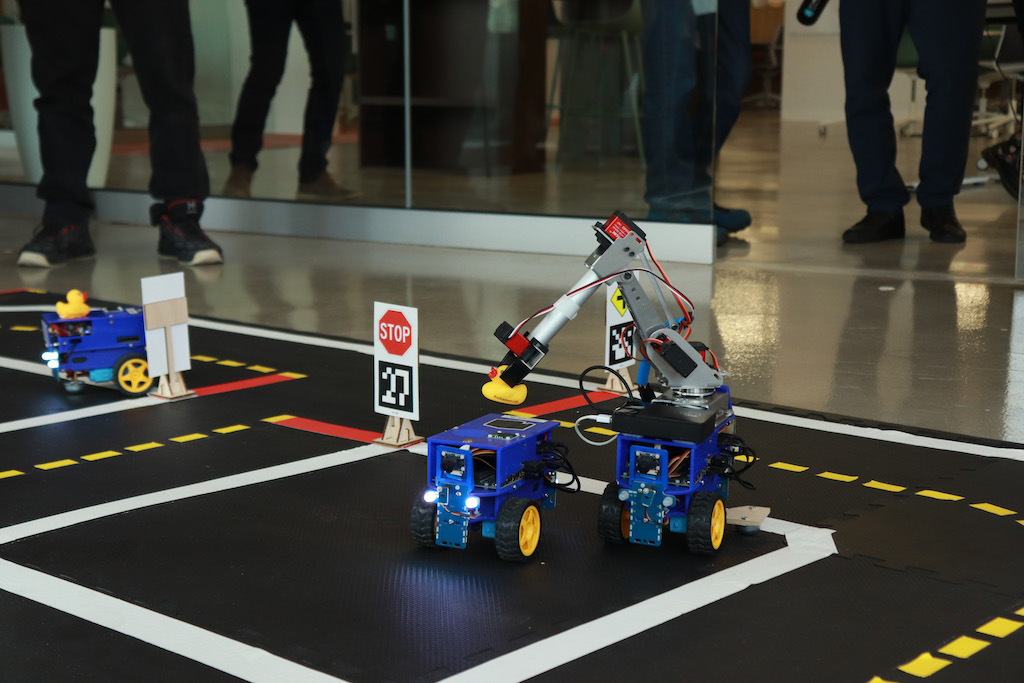A demo of self-driving robots that navigate a "town" populated by rubber ducks, a look at how machine learning could help grow meat in the lab, and a walk-through of industrial uses of AI are among the various aspects of the emerging technology that were explored at Upper Bound.
"There is no better time to be in AI," said Cam Linke, CEO of the Alberta Machine Intelligence Institute (Amii) in his keynote address. "If you're a business, or an entrepreneur, or a government, this should excite you and scare you at the same time."
Researchers, entrepreneurs, and curious onlookers from Edmonton and around the globe gathered to learn more at Edmonton's second annual AI conference, which ran from May 23 to 26. Amii awarded 833 talent bursaries to researchers from 22 different countries and had another 676 tune in virtually.
In addition to Rich Sutton's closing keynote announcing OpenMind Research, the conference featured a wide range of sessions. Here are a few that caught our eye:
Duckietown lets U of A students dive into robotics
Pairing adorable rubber ducks with AI technology, the University of Alberta ran its first semester-long course using Duckietown in the 2023 winter semester. It offers robotics students an opportunity to get rigorous hands-on experience within a worldwide research project that originated at MIT in 2016.
Students learn to program small, self-driving vehicles carrying rubber duck passengers. Their assignments include getting the vehicles to stay within the lanes of their model town roads, park in an assigned spot, and stop and check for "pe-duck-strians" at crosswalks.
It's a challenge that can be daunting for prospective students.
"In a lot of computing science classes, it's trying to recreate things other people have done," said Matt Taylor, a Canada CIFAR AI chair with Amii and the instructor of the course that uses Duckietown. "In robotics, we are often doing things no one has done before because we try to make the class individualized and special."
Duckietown alumni have gone on to work with robotics at a number of companies, including Attabotics, a warehouse automation company in Calgary that Amii has been working with to increase productivity and decrease the amount of space needed.

University of Alberta students demo their self-driving robots during a demo of Duckietown at Upper Bound on May 25, 2023. (Ashley Lavallee-Koenig)
Siloed info hampers ML potential in cellular agriculture
It's difficult to fully gauge how machine learning could aid in the development of cellular agriculture because companies involved in the industry keep so much of their research private, say those involved in a collaboration between Amii and New Harvest.
"Most of the data on development for these species of cell lines and media design is actually happening in secret in companies. So we're getting a lot of siloing of data within the fields, which is a challenge outside of ML," said Breanna Duffy, director of responsible research and innovation at New Harvest, a non-profit that funds research to develop the field of lab-grown food. "Something New Harvest is working really hard to do is get more data sharing and more academic discourse happening, but it definitely impacts the application of ML."
Duffy participated in a session with Jubair Sheikh of Amii and researcher Michael Todhunter, who is conducting a survey of potential applications of AI and ML in the cellular agriculture field.
One potential use would be to optimize the development of the media in which the cells grow. Finding the right combination of ingredients can be lengthy and complicated. Artificial intelligence could potentially test and monitor input combinations more effectively than trial and error.
With more readily available data, the panel said, machine learning could aid attempts at growing more complicated protein structures like steak, as well as less-understood kinds of meat such as that from crustaceans. Cultivated meat is seen as one of the ways to mitigate the environmental effects of traditional meat production.

Deborah Akaniru (left) of Amii interviews Breanna Duffy, Michael Todhunter, and Sheikh Jubair about the potential for machine learning in cellular agriculture at Upper Bound on May 24, 2023. (Ashley Lavallee-Koenig)
ML said to increase efficiency in oilfield and warehouses
Two Calgary-based industrial companies shared how they use machine learning in energy and supply chains with the help of Amii.
Kobold Completions Inc. is an oilfield service company that monitors what what can't be seen down the hole. It's not easy to get "a traditional company into the digital age," said development and operations manager David Cooper. But being able to offer more insight more quickly based on the huge amount of data the company collects is valuable.
"They've already moved the rig to another well, and if they need to make changes to their drilling program, based on the job that was just run, they need to know as soon as the job is over," he said of his clients.
Focusing on the retail supply chain, Routeique uses ML to help it move products through the manufacturer-to-consumer chain with transparency and efficiency across multiple partners.
"How do we make it seem and appear and function as if it's a single entity, a single network, when it's actually a whole group of ragtag partners?" said Michael Allan, president and CEO of Routeique.
Some of the puzzle pieces Routeique's ML system monitors include product and truck location as well as the timing of deliveries. This data not only keeps all the involved partners up to speed but can also act as a record of evidence for disputes as well.

David Cooper discusses Kobold's use of machine learning in the oil and gas industry at Upper Bound on May 24, 2023. (Ashley Lavallee-Koenig)
To hear more on what we learned at Upper Bound, watch for a special episode of Bloom, Taproot's podcast about innovation in Edmonton.
